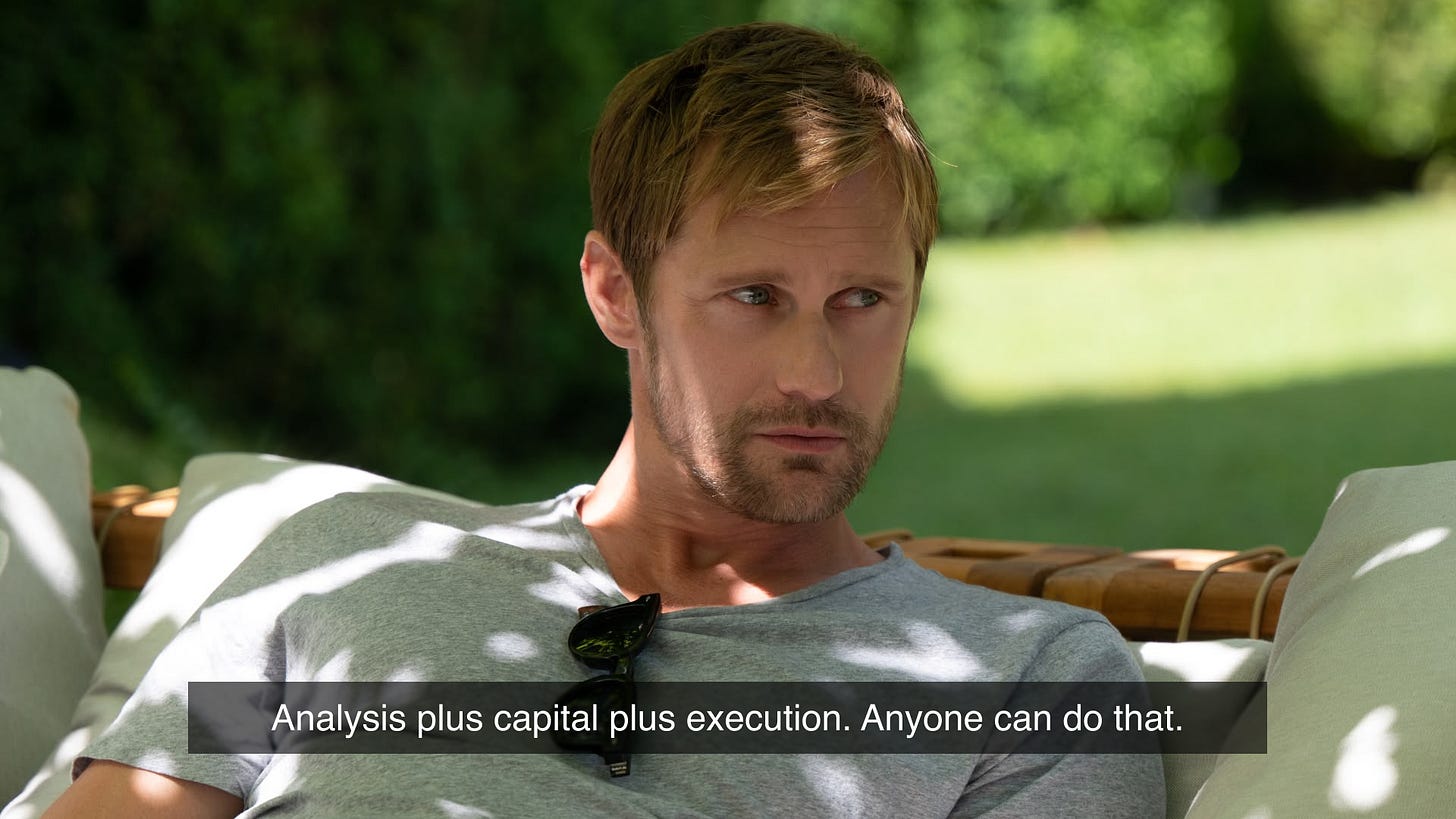Infinite Unicorns and the Rise of AI Agents
Exploring a future where a single founder orchestrates analysis, capital, and execution through seamless AI collaboration.
"Success doesn't really interest me anymore. It's too easy. Analysis plus capital plus execution... anyone can do that."
When Lukas Matsson, the hyper-successful tech CEO from Succession, delivered this dismissive line to Roman Roy, played by Kieran Culkin, he showcased a kind of jaded arrogance. The scene unfolds during tense discussions about a multi-billion-dollar merger with Roy’s family's media conglomerate. Matsson had conquered the entrepreneurial mountain, finding it too formulaic to be rewarding. What Matsson didn't fully appreciate was that soon everyone might feel similarly unimpressed, as AI agents make his seemingly straightforward formula of analysis, capital, and execution genuinely accessible to almost anyone.
Sam Altman recently predicted we'll soon see a billion-dollar unicorn built by a single individual orchestrating a team of AI agents, rather than by a small founding team. This scenario might seem improbable initially, until you consider the potential role AI could soon play.
Enter the Bots: OpenAI and MCP
OpenAI recently announced support for Anthropic’s Model Context Protocol (MCP), a new standard enabling AI agents from different platforms to communicate seamlessly. MCP provides a universal communication layer through standardized data structures and messaging formats, allowing agents from diverse AI ecosystems to exchange context, coordinate tasks, and integrate seamlessly with multiple business systems and data sources.
Previously, AI agents struggled to interact beyond their specific environments, severely restricting their utility. For example, booking a simple business trip might require multiple separate AI agents: one agent to analyze your calendar and availability, another to communicate with hotel reservation systems, and yet another to handle payments and expense management. Without interoperability, each step would involve manual intervention and isolated processes. MCP directly addresses this challenge, enabling all these AI agents to seamlessly communicate and coordinate their activities, making interoperability straightforward and reliable.
Already, Anthropic, OpenAI, and several leading enterprise software providers are integrating MCP into their AI systems, recognizing its potential as the critical missing link for the full orchestration of AI-driven tasks.
With MCP-enabled interoperability, AI could soon realistically deliver on Matsson's formula for success:
Analysis: AI agents gather, synthesize, and interpret insights across marketing, product, financial, and operational systems.
Capital: Intelligent agents manage budgets, allocate resources efficiently, dynamically monitor cash flow, and identify new funding opportunities.
Execution: AI agents seamlessly coordinate workflows, campaigns, product development cycles, sales activities, and operational logistics with minimal human oversight.
Additionally, there's a supervisory layer,a specialized AI that oversees and coordinates the entire agent ecosystem, ensuring all activities align seamlessly with the founder's overarching strategic vision. This supervisory AI acts as the central conductor, integrating insights and operations from various specialized agents to deliver cohesive and effective outcomes.
The Invisible Army
Instagram famously achieved a $1 billion acquisition with only 13 employees, groundbreaking efficiency at the time. Imagine replacing even those roles with an interconnected, invisible army of specialized AI agents:
Strategy Agent: Analyzes market conditions, competitors, and growth opportunities.
Development Agent: Writes, tests, debugs, and continuously improves code.
Marketing Agent: Designs personalized campaigns, optimizes performance, and boosts customer engagement.
Sales Agent: Qualifies leads, manages customer relationships, negotiates deals, and closes transactions.
Financial Agent: Tracks budgets, optimizes spending, identifies cost-saving strategies, and proactively manages financial health.
These agents collaborate seamlessly, continuously exchanging data and context through MCP.
The Human Element
While AI's compelling promise is undeniable and will shape the future significantly, there remains an important role for humans. AI doesn't yet account for every scenario, particularly tasks that require uniquely human attributes:
Navigating complex ethical decisions not reducible to clear metrics.
Interpreting nuanced customer feedback and subtle market signals.
Adapting creatively and rapidly when disruptions occur.
Making sensitive leadership decisions involving empathy and emotional intelligence.
Establishing trust and credibility through personal relationships.
AI manages predictable tasks effectively, but humans excel precisely where certainty breaks down. Matsson himself hinted at this complexity, "But failure, that's a secret." True entrepreneurship thrives in ambiguity, innovation, and creative pivots.
Transforming the Founder’s Role
The future isn't about automating founders out of existence. Instead, AI liberates them from routine tasks. Founders can focus their energy on solving complex problems, making nuanced judgment calls, and strategic innovation.
Rather than drowning in operational details, the founder’s role shifts toward high-level vision, creative leadership, and crisis management, uniquely suited to human strengths.
Shaping the New Startup Paradigm
As Box CEO Aaron Levie observed, interoperability standards like MCP are critical. Businesses must decide whether enterprise tools primarily rely on AI-driven orchestration or traditional deterministic algorithms.
Regardless, the concept of a single-founder unicorn powered by agentic AI seems increasingly inevitable. This transformation will profoundly democratize entrepreneurship, placing previously unreachable scale within individual founders' grasp.
Matsson was right to trivialize and simplify the path to entrepreneurial success,after all, he'd already climbed to the summit. Yet what he didn't realize is that this seemingly effortless formula will soon become commonplace as AI democratizes the processes of analysis, capital allocation, and execution. In such a world, the critical factors distinguishing success from failure will increasingly rely on uniquely human traits like emotional intelligence, strategic vision, taste, empathy, connection, and the ability to inspire others.
The army of one is coming, powered by AI and guided by human insight. And it might arrive sooner than we expect.


